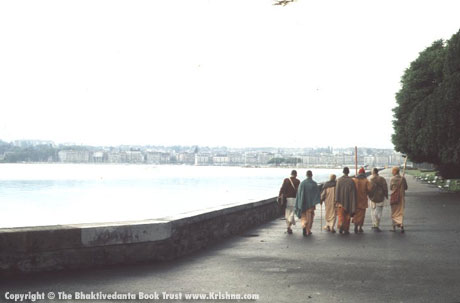HH Bhaktividyā Pūrṇa Mahārāja: One thing in the performance of your duties, Sir. Excuse me, we are addressing the cinematographers here. Because there is the vivarta-vāda, there is an illusion amongst cinematographers that because they have a camera they are God and they can do whatever they like. So you have to understand: what is going on here is a relationship between someone speaking and those who are listening. So the efficiency of that is what should be seen. So if you want to document it, that is nice, we are very happy, but you have to do it without disturbing what is going on.
Like you have a group of ladies there, generally even though it is more efficient to cut cross and you could probably step on a few that would even shorten the distance by another half a meter, you can go around the back. Because otherwise then they become disturbed, when they lose it, because I am working on the collective mentality of what is there, there is a mood, there is a vibe, and as soon as it gets distracted it throws off the whole thing.
Because if you do that, then you find that, the best photographers, cinematographers I have seen – they are invisible, you don’t see them, they come in, they get their shot, they leave, you don’t know. The worst ones are the ones because they have a camera they are the center of the universe, everyone has got to move and adjust and understand that this is saving it for prosperity, and generally you never see their photographs or movies ever again.
I remember once, it is in the BTG [Back To Godhead], it is a big double page in the BTG, Viśākhā Mātājī took it, she came in, 120 kids, she set them up in about 10, 15 minutes, ‘Ok, you guys sit here, you here, this and there,’ like that. She went, sat down in the bushes, because that was the best angle on it, took two or three shots, done. And that picture is very prominent.
I remember others, they would come in and this and that, and doing so many things you never see, because they disturb the mood. The trick is to be able to get in without being seen, get what you want. Like we had one guy yesterday, he is sitting here and then moving around, taking the shots of everybody, he is completely missing the point.
Just on that, if you do that, then it works very nicely, and then you also because you are not disturbing the devotees you yourself are able to have a finer perception, because that is what is very important, because you are trying to capture the moment, the interaction, not document just the bodies sitting there. So the more subtle you are in understanding those relationships the more you will be able to see them and catch them.
It is an important thing, but it also has its place, because it can’t disturb everybody else. Just like you can’t say, ‘Okay, you can’t take them,’ that is also a disturbance, because in the temple they don’t let take pictures. So that balance between it then works very nicely and then it is good.


Comments